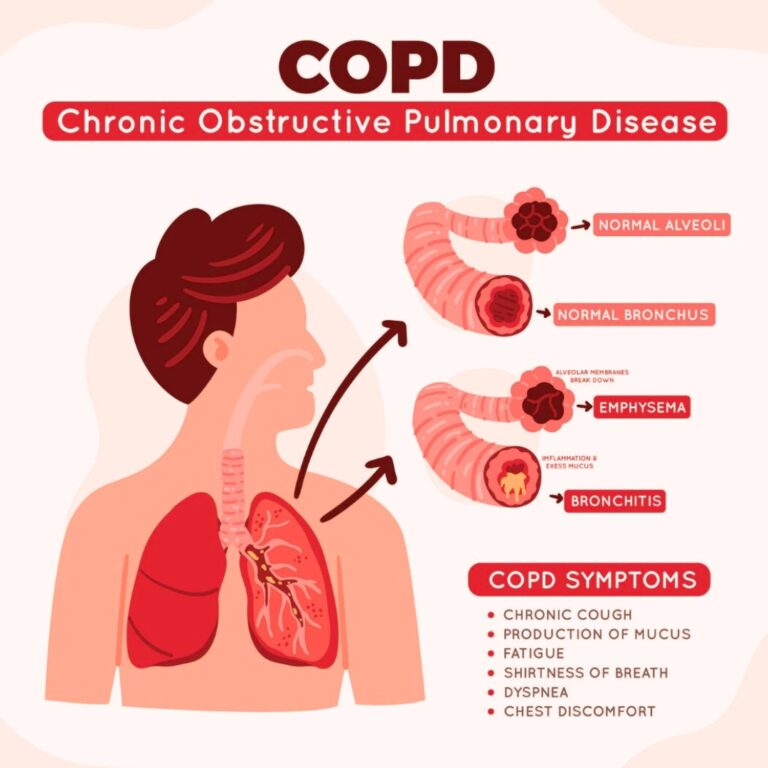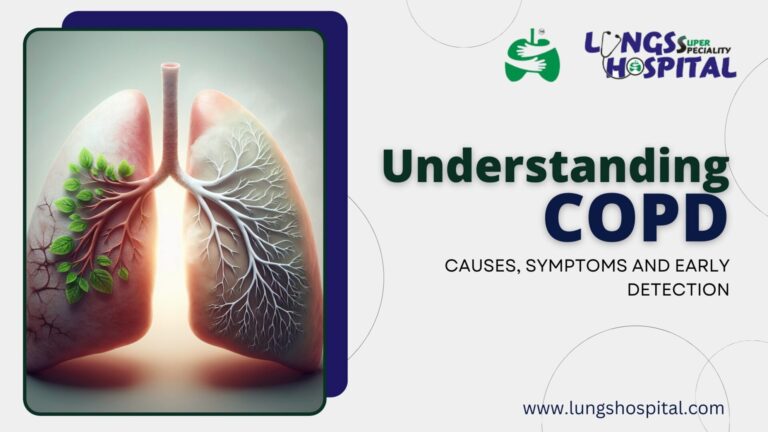Chronic Obstructive Pulmonary Disease, or COPD, is a progressive lung disease that makes it difficult for individuals to breathe. It is usually caused by long-term exposure to harmful gases and particles, most commonly from cigarette smoke, but it can also arise due to environmental factors or genetic predisposition. This lung condition can significantly impact daily activities and overall quality of life. Early detection of COPD plays a vital role in managing symptoms effectively and improving patient outcomes. Learn more at Lungs Hospital.
What Causes COPD?
The primary cause of COPD is long-term exposure to irritants that damage the lungs. In most cases, cigarette smoking is the leading factor, as it directly exposes the lungs to harmful chemicals. However, other causes include:
- Air pollution: Regular exposure to pollutants in the air, such as dust, fumes, and chemical vapors.
- Occupational hazards: Working in environments with harmful dust or chemicals, like in construction or mining.
- Genetics: A small percentage of people may inherit a deficiency in a protein called alpha-1-antitrypsin, which protects the lungs, making them more susceptible to COPD.
- Secondhand smoke: Exposure to smoke from others can also lead to lung damage and increase the risk of Chronic Obstructive Pulmonary Disease.
Common Symptoms of COPD
COPD symptoms can vary but tend to develop slowly over time. Early signs may be subtle, leading individuals to dismiss them as effects of aging or lack of fitness. Common symptoms include:
- Persistent cough: Often referred to as a “smoker’s cough,” this is one of the most common signs.
- Shortness of breath: Especially noticeable during physical activities like climbing stairs or walking.
- Frequent respiratory infections: People with Chronic Obstructive Pulmonary Disease are more prone to colds, flu, and other respiratory illnesses.
- Wheezing: A whistling sound while breathing.
- Chest tightness: Some individuals may feel pressure or heaviness in their chest.

Why Early Detection of COPD Is Important
Detecting Chronic Obstructive Pulmonary Disease early can help prevent severe damage to the lungs, making treatment more manageable. Early diagnosis allows doctors to develop a personalized plan to reduce symptoms and slow disease progression. This could involve lifestyle changes, quitting smoking, using inhalers, or undergoing specific therapies designed for COPD patients.
Diagnosing
If it is suspected, doctors may conduct a series of tests to confirm the diagnosis. Some of these include:
- Spirometry: A simple breathing test that measures how much air a person can inhale and exhale.
- Chest X-rays or CT scans: These imaging tests help identify any damage in the lungs.
- Blood tests: To measure oxygen levels in the blood and assess lung function.
Managing COPD Symptoms
While COPD is a chronic condition, individuals can manage their symptoms with lifestyle changes and treatments. Some methods include:
- Quit smoking: This is the most crucial step to prevent further damage to the lungs.
- Use of inhalers and medications: Inhalers help open up the airways, making breathing easier.
- Pulmonary rehabilitation: This includes exercises, nutrition advice, and counseling.
- Oxygen therapy: For individuals with advanced COPD, oxygen therapy may be recommended to ensure enough oxygen is reaching the bloodstream.
Understanding COPD and recognizing the early signs can make a significant difference in how it progresses. Lifestyle changes, like quitting smoking and avoiding air pollutants, along with early medical intervention, can help manage Chronic Obstructive Pulmonary Disease and improve the quality of life for those affected.
FAQs
The primary cause is cigarette smoking, but other factors like air pollution, occupational exposure, and genetics can also contribute.
Avoiding smoking and minimizing exposure to lung irritants can help prevent Chronic Obstructive Pulmonary Disease.
It is a chronic condition, meaning it can’t be cured, but symptoms can be managed effectively with proper treatment and lifestyle adjustments.
While it’s more common in older adults, younger people with genetic predispositions, such as an alpha-1-antitrypsin deficiency, may develop Chronic Obstructive Pulmonary Disease.
Schedule an appointment with a healthcare professional for an assessment. Early detection is key to managing COPD effectively.



